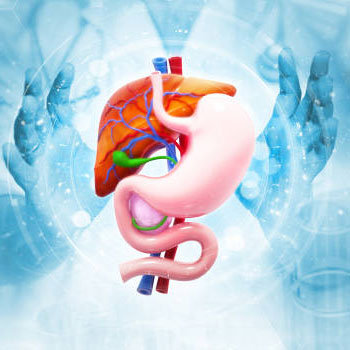Gastroenterology is a branch of medicine that focuses on the health of the digestive system, or the gastrointestinal (GI) tract. Gastroenterologists are medical professionals who specialize in diagnosing and treating diseases of the digestive organs, which include the stomach, intestines, esophagus, liver, pancreas, gallbladder, and bile ducts. This article provides a comprehensive overview of gastroenterology, its significance, the conditions it addresses, and the diagnostic and treatment methods utilized by gastroenterologists.
The Digestive System: An Overview
The digestive system is a complex network of organs responsible for breaking down food, absorbing nutrients, and eliminating waste. It includes
- Mouth: The starting point of digestion where food is chewed and mixed with saliva.
- Esophagus: A muscular tube that transports food from the mouth to the stomach
- Stomach: Produces acids and enzymes to break down food
- Small Intestine: Absorbs nutrients from digested food
- Large Intestine (Colon): Absorbs water and forms waste (feces).
- Rectum and Anus: Eliminates waste from the body.
- Liver: Produces bile to help digest fats
- Pancreas: Produces enzymes and hormones like insulin
- Gallbladder: Stores bile produced by the liver
What is Gastroenterology?
Gastroenterology is the study of the normal function and diseases of the esophagus, stomach, small intestine, colon and rectum, pancreas, gallbladder, bile ducts, and liver. It involves a detailed understanding of the physiology of the GI organs, including the movement of material through the stomach and intestine, digestion and absorption of nutrients into the body, removal of waste from the system, and the function of the liver as a digestive organ.
What are the Common Gastrointestinal Disorders?
Gastroenterologists diagnose and treat a wide range of conditions, including but not limited to
Gastroesophageal Reflux Disease (GERD)
A chronic condition where stomach acid frequently flows back into the esophagus, causing irritation.
Irritable Bowel Syndrome
A disorder characterized by abdominal pain and changes in bowel habits.
Inflammatory Bowel Disease
Includes Crohn's disease and ulcerative colitis, which involve chronic inflammation of the digestive tract
Hepatitis
Inflammation of the liver, often caused by viral infections
Gallstones
Hardened deposits of digestive fluid that can form in the gallbladder
Pancreatitis
Inflammation of the pancreas
Celiac Disease
An immune reaction to eating gluten, a protein found in wheat, barley, and rye.
Peptic Ulcers
Sores that develop on the lining of the stomach, small intestine, or esophagus.
Colon Cancer
Cancer of the large intestine, often starting as benign polyps that can become malignant.
What are the Diagnostic Procedures in Gastroenterology?
Gastroenterologists use a variety of diagnostic procedures to identify and treat GI disorders. Some common procedures include
Endoscopy
Endoscopy involves using a flexible tube with a light and camera (endoscope) to examine the digestive tract. Types of endoscopy include
- Upper Endoscopy (EGD): Examines the esophagus, stomach, and duodenum.
- Colonoscopy: Examines the colon and rectum
- Endoscopic Retrograde Cholangiopancreatography (ERCP): Examines the bile ducts, gallbladder, and pancreatic duct
- Endoscopic Ultrasound (EUS): Combines endoscopy with ultrasound to obtain detailed images of the digestive tract and surrounding tissues
Imaging Tests
Imaging tests provide detailed pictures of the digestive organs and can help identify abnormalities. Common imaging tests include
- X-rays: Often used with a contrast medium (barium) to highlight the digestive tract.
- CT Scans: Provide cross-sectional images of the abdominal organs
- MRI: Uses magnetic fields to produce detailed images of the digestive organs
- Ultrasound: Uses sound waves to create images of organs like the liver, gallbladder, and pancreas
Laboratory Tests
Laboratory tests analyze blood, urine, and stool samples to detect signs of GI disorders. Common tests include
- Liver Function Tests: Measure levels of enzymes and proteins in the blood to assess liver health
- Stool Tests: Detect infections, inflammation, and digestive issues
- Blood Tests: Check for markers of inflammation, infection, and other conditions
What are the Treatment Approaches in Gastroenterology?
The treatment of gastrointestinal disorders varies depending on the condition, its severity, and the patient's overall health. Gastroenterologists employ a range of treatments, including
Medication
Many GI conditions are managed with medications that can reduce symptoms, control inflammation, and address underlying causes. Common medications include
- Antacids and Proton Pump Inhibitors (PPIs): Reduce stomach acid to treat GERD and ulcers
- Antibiotics: Treat bacterial infections such as Helicobacter pylori, which can cause ulcers
- Anti-inflammatory Drugs: Used for conditions like IBD to reduce inflammation
- Laxatives and Antidiarrheals: Manage symptoms of IBS and other bowel disorders
Lifestyle Modifications
Lifestyle changes can significantly impact digestive health. Gastroenterologists often recommend
- Dietary Changes: Avoiding trigger foods, eating a balanced diet, and increasing fiber intake
- Exercise: Regular physical activity can improve digestion and overall health
- Stress Management: Techniques like mindfulness, meditation, and yoga can help manage stress-related GI symptoms
- Weight Management: Maintaining a healthy weight can reduce the risk of conditions like GERD and fatty liver disease
Surgical Interventions
In some cases, surgery is necessary to treat GI conditions. Common surgical procedures include
- Cholecystectomy: Removal of the gallbladder, often due to gallstones
- Appendectomy: Removal of the appendix, typically due to appendicitis
- Resection: Removal of diseased sections of the intestine, often used in IBD and colon cancer
- Bariatric Surgery: Weight-loss surgery for obese patients, which can also improve conditions like GERD and fatty liver disease
Endoscopic Procedures
Minimally invasive endoscopic procedures are often used to treat GI conditions. These procedures include
- Polypectomy: Removal of polyps during a colonoscopy to prevent colon cancer
- Endoscopic Mucosal Resection (EMR): Removal of early-stage cancer or precancerous growths
- Stricture Dilation: Widening narrowed sections of the esophagus, stomach, or intestines
- Stent Placement: Inserting a stent to keep a narrowed or blocked passage open
What is the Role of the Gastroenterologist?
Gastroenterologists play a crucial role in diagnosing, treating, and managing digestive diseases. Their responsibilities include
- Patient Evaluation: Taking a detailed medical history and conducting physical exams
- Diagnostic Testing: Ordering and performing tests to identify the cause of symptoms
- Treatment Planning: Developing individualized treatment plans based on the diagnosis
- Procedural Expertise: Performing endoscopic and other minimally invasive procedures
- Patient Education: Providing information on managing conditions, medications, and lifestyle changes
- Ongoing Care: Monitoring chronic conditions and adjusting treatment as needed
When to See a Gastroenterologist
Individuals should consider seeing a gastroenterologist if they experience
- Persistent or severe abdominal pain
- Chronic diarrhea or constipation
- Blood in the stool
- Unexplained weight loss
- Difficulty swallowing
- Persistent heartburn or acid reflux
- Jaundice (yellowing of the skin and eyes).
What are the Advancements in Gastroenterology?
The field of gastroenterology is continually evolving with advancements in medical research and technology. Recent developments include
Precision Medicine
Precision medicine involves tailoring treatments based on an individual's genetic makeup, lifestyle, and environment. This approach allows for more personalized and effective treatments for GI conditions
Advanced Imaging Techniques
New imaging technologies provide clearer and more detailed images of the digestive tract, aiding in the early detection and treatment of GI diseases. Techniques like virtual colonoscopy and advanced endoscopic imaging are becoming more widely used.
Minimally Invasive Procedures
Advancements in endoscopic technology have led to more minimally invasive procedures, reducing recovery times and improving patient outcomes. Innovations like endoscopic submucosal dissection (ESD) allow for the removal of larger tumors without traditional surgery.
Microbiome Research
Research into the gut microbiome— the community of microorganisms living in the digestive tract— is uncovering new insights into its role in digestive health and disease. Understanding the microbiome's impact on conditions like IBS, IBD, and even mental health is leading to novel treatment approaches.
Gastroenterology is a vital medical specialty focused on the health of the digestive system. Gastroenterologists diagnose and treat a wide range of conditions, from common issues like GERD and IBS to more complex diseases like IBD and liver disorders. With advancements in diagnostic techniques and treatment options, gastroenterologists are better equipped than ever to improve digestive health and enhance the quality of life for their patients.
Understanding the importance of digestive health and recognizing when to seek specialized care can lead to early detection and effective management of gastrointestinal conditions. Whether through lifestyle modifications, medications, or advanced medical procedures, the field of gastroenterology offers numerous avenues to maintain and restore digestive well-being.

